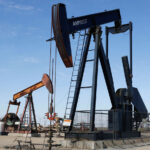New Study Confirms Ties Between Fracking and Asthma Attacks

Hydraulic fracturing’or ‘fracking”which involves the high powered injection of water and chemicals into a drilled area to release natural gas has raised various concerns about its impact on the environment. But fracking may also impact the health and safety of workers and people who live near fracking sites.
For example, one study found that the proximity of natural gas wells may be associated with the prevalence of skin and respiratory conditions in residents living near natural gas extraction activities. A new study has confirmed that health problems may be linked to fracking well sites.
The study by researchers from Johns Hopkins Bloomberg School of Public Health found that people with asthma who live near bigger or larger numbers of active unconventional natural gas wells operated by the fracking industry in Pennsylvania are significantly more likely to have asthma attacks than those who live farther away.
In the study, the researchers analyzed health records from 2005-2012 from a healthcare provider that covers 40 counties in north and central Pennsylvania. They identified more than 35,000 asthma patients between the ages of five and 90. They also identified:
- 20,749 mild attacks (requiring a corticosteroid prescription)
- 1,870 moderate ones (requiring an emergency room visit)
- 4,782 severe attacks (requiring hospitalization).
The researchers then mapped where the patients with these attacks lived, assigning them metrics based on the location, size, number, phase, total depth and gas production of the wells, and compared them to asthma patients who didn’t have attacks in the same year.
Those who lived closer to a large number or bigger active natural gas wells were 1.5-4 times more likely to suffer asthma attacks. And although these asthma attacks were likely to occur more frequently around wells throughout the four phases of the development process, the researchers found that the increased risk was greater during the production phase, which can last many years.
These findings held up even when accounting for other factors that can exacerbate asthma, including proximity to major roads, family history, smoking, socioeconomics, etc.
‘We are concerned with the growing number of studies that have observed health effects associated with this industry,’ says the study’s senior author, Brian S. Schwartz, MD, MS, a professor in the Department of Environmental Health Sciences at the Bloomberg School. ‘We believe it is time to take a more cautious approach to well development with an eye on environmental and public health impacts.’
For more on the impact of fracking on the environment and human health, see:
- Air emissions from fracking sites may be hazardous
- Ties between fracking and earthquakes
- Worker exposure to silica during fracking operations (and how to protect them).